CIA Sponsored Terror, Civil Liberties, Criminalizing Dissent, Human Rights, Political Prisoner, Truth to Power, War Resister
Podcast: Play in new window | Download
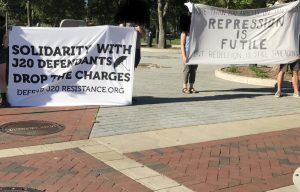
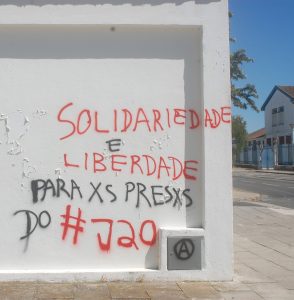
Defend J20: First Protestors
Last January, at Donald Trump’s Inauguration, over 230 people—some protesters, some not—were trapped and arrested by police. Federal prosecutors charged them with a crime that actually doesn’t exist in DC: “felony rioting.” Armed with secret warrants, prosecutors then probed deeply into the defendants’ personal lives.
Charges were dropped for some arrestees, including journalists and legal observers. Over 200, however, saw their charges increased to felony rioting, felony incitement to riot, conspiracy to riot, and property-damage crimes related to broken windows. Each defendant is facing over 60 years in prison.
Prosecutors obtained warrants focused on anti-Trump organizers. Warrants sought a list of visitors to a protest-related website and the Facebook friends and related communications of two organizers, the host of a coalition Facebook page, and those who had “liked” that page.
This prosecution follows a change in local law enforcement’s response to protest that we covered years ago on Law and Disorder. The mass arrests and harsh charges are precisely what new DC policies were designed to avoid. A 2002 mass-arrest and subsequent lawsuit by the Partnership for Civil Justice resulted in the District paying over $10 million in settlements and changing its crowd control policies.
Trials for the inauguration protesters begin mid-November and are expected to continue for a year.
Guest – Yael Bromberg, Yael is a supervising attorney and teaching fellow with the Institute for Public Representation at the Civil Rights Clinic of Georgetown University Law Center. defendj20resistance.org
—-
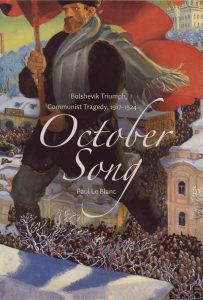
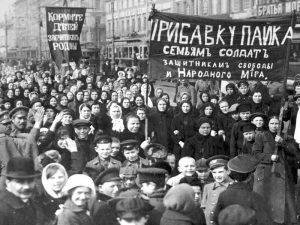
October Song: Bolshevik Triump, Communist Tragedy 1917-1924
This year marks the 100th anniversary of the Russian Revolution of October, 1917. The revolution changed the course of history and determined world politics internationally and in the United States of America for most of the 20th century, until finally, under the unrelenting onslaught of the west and principally the USA, the revolution was overthrown in 1991 when capitalism was restored to that country.
Before the revolution, Russian was a feudal monarchy, headed up by a czar in a country where most of the population were peasants working the land under near slave-like conditions.
World War I started in 1914 and Russia allied with France and Great Britain against Germany and other countries. It was a war for foreign markets, resources, and colonies. By 1917, 30 million people have been killed. In one week alone 250,000 soldiers died.
The Russian revolution was nearly bloodless and nonviolent. The first thing the revolutionary government did was to end their country’s participation in the war, which ultimately ended the war.
The second thing they did was to redistribute the land to the peasants who worked it. Then they nationalized industry under control of the workers in the plants. Thus, the 1% of the Russian elite were dispossessed and the 99% took control of the institutions of their country and ran them through councils of workers and peasants and soldiers, which had been organized prior to the revolution and which were led by socialists.
The Russian revolution inspired the hopes of humankind throughout the industrial and under-developed colonial world. The peasants were given land, women gained equal rights and the right to vote and to get an abortion. Homosexualty was made legal. Minority rights were guaranteed. Education, the arts, and culture received government support. For a period Russia was the most democratic country on the planet.
We speak today with history professor Paul LeBlanc about the Russian revolution and the lessons it teaches for social change activists in America today.
Guest – Professor Paul LeBlanc is the author of the just published book October Song: Bolshevik Triumph, Communist Tragedy, 1917-1924. He is the author of a number of widely read studies including Lenin and the Revolutionary Party and Marx, Lenin, and the Revolutionary Experience. He teaches at Laroche college in Pittsburgh.
Follow Heidi Boghosian on Twitter – @HeidiBoghosian
CIA Sponsored Terror, Civil Liberties, Human Rights, Truth to Power, War Resister
Podcast: Play in new window | Download
Law and Disorder Editorials:
—-
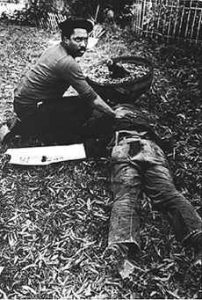
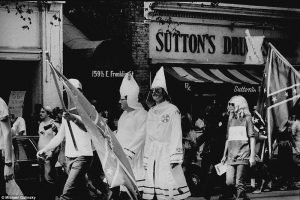
Lessons From The Greensboro Massacre
Thirty eight years ago, on November 3, 1979, 35 heavily armed members of the Ku Klux Klan and the American Nazi party drove nine vehicles through the city of Greensboro, North Carolina, and opened fire on a multi-racial group of demonstrators who were gathering at a black housing project in preparation for an anti-Klan march.
Using semi automatic rifles, shotguns and pistols the Nazis and Kukluxers fired 1000 projectiles in 88 seconds killing five march leaders and wounding seven other demonstrators.
Most of the victims were associated with the Communist Workers Party, a multi racial group which had been organizing in the south for workers rights in the cotton mills and against the Ku Klux Klan.
The Greensboro police, the Bureau of Alcohol, Tobacco, and Firearms, and the Federal Bureau of Investigation were all aware of the planned attack. Four TV stations captured the massacre on video. A reluctant local district Attorney obtained six indictments under pressure from the Greensboro Justice Fund which had been organized by the windows of the victims, and the public outcry. A six-month trial resulted in the acquittal of all six defendants.
Then a reluctant Reagan administration Department of Justice tried nine of the Klansmen and Nazis on civil rights conspiracy charges. After a three-month trial all nine were acquitted.
A year after the massacre a civil rights suit was brought on behalf of the 16 victims. It expose d the depth and contours of official involvement.
After an extraordinary dramatic 10 weeks civil trial a southern jury finally convicted a good number of the actors in the massacre. The verdict was national news.
Guest – Attorney G.Flint Taylor, a graduate of Brown University and Northwestern Law School, is a founding partner of the People’s Law Office in Chicago, an office which has been dedicated to litigating civil rights, police violence, government misconduct, and death penalty cases for more than 40 years.
—————
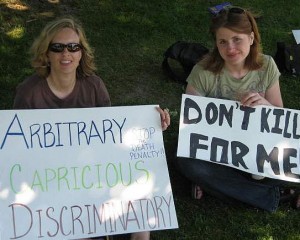
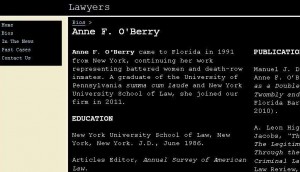
Lawyers You’ll Like: Anne O’Berry
As part of our Lawyers You’ll Like series we’re joined by attorney Anne O’Berry, she’s the Vice President of the Southern Region of the National Lawyers Guild and the author of The Law Only As An Enemy: The Legitimization of Racial Powerlessness Through the Colonial and Antebellum Criminal Laws of Virginia. While in law school, she served as Director of the Women in Prison Project at Rikers Island, where she taught incarcerated women how to prevent termination of their parental rights.
Anne clerked for federal judges in New York, New Jersey and Pennsylvania, including Judge A. Leon Higginbotham, Jr. of the U.S. Court of Appeals in Philadelphia, with whom she co-authored an article on the law as a tool of oppression against slaves and free blacks in pre-Civil War Virginia and taught civil rights and South African apartheid law at the University of Pennsylvania. She later taught Race and the Law at St. Thomas University Law School in Miami, Florida.
In the last 12 years, Anne has served as counsel at a Florida law firm that specializes in class action litigation, particularly in the areas of securities, consumer and economic fraud, as well as some environmental and privacy rights litigation.
Attorney Anne O’Berry:
- We did a lot of historical research in terms of racism and the law back in pre-civil war Virginia.
- We focused on Virginia because it was a paradigm for slavery basically in the slave laws that were in place.
- We wrote an article for publication, it was published in the University of North Carolina law review. The Law Only As An Enemy:’ The Legitimization of Racial Powerlessness Through the Colonial and Antebellum Criminal Laws of Virginia.
- Depending on your status, if you were a free white person or a slave, you were treated differently by the law.
- As an overall theme, depending on the race of the victim was that would effect what your sentence would be.
- For example, if a black woman was raped, that was not considered a crime. If you were a black person and you stole something, you would be put to death.
- It was ironic for the slave owner because if their slave was put to death, they would have to be compensated by the state.
- If the victim was black, the crime was treated less seriously than if the victim was white.
- I started out working at a firm in New York, a large prominent, Wall Street type.
- Among some people I was known as the pro-bono queen.
- I was there for 2 and a half years and the first pro-bono case was a death penalty case.
- The court ruled back then (1990s) that it was ok to execute the mentally retarded.
- I was so moved by that experience that I gave up my cushy job in New York and go do death penalty work full time.
- I ended up at the Federal Resource Center doing death penalty work in Tallahassee Florida.
- I worked for the Battered Women’s Clemency Project in Florida.
- More recently the Supreme Court did rule that it is unconstitutional to execute people who were juveniles at the time of the offense and unconstitutional to execute people who are mentally retarded.
- I believe in my lifetime we will see the end of the death penalty in this country.
- It’s just an amazing system that we have where the courts will say – yes you’ve got compelling evidence of innocence but we’re not going to hear your case.
- I would say what got me through was the victories.
- Presently, I’m working with an attorney Jim Green, who’s a prominent civil rights attorney in West Palm Beach, kind of a legend down here.
- I also some volunteer work with El Sol. It’s a day laborer center in Jupiter, Florida.
Guest – Anne O’Berry, National Lawyers Guild’s Regional Vice President for the Southern Region and a member of the Guild’s South Florida chapter. She obtained her undergraduate degree from the University of Pennsylvania in 1983 and her law degree from New York University Law School in 1986. While in law school, she served as Director of the Women in Prison Project at Rikers Island, where she taught incarcerated women how to prevent termination of their parental rights. She was a member of the law school’s civil rights clinic and an editor on one of the law school’s journals, and authored a law review article on prisoners’ rights. During and after law school, she clerked for federal judges in New York, New Jersey and Pennsylvania, including Judge A. Leon Higginbotham, Jr. of the U.S. Court of Appeals in Philadelphia, with whom she co-authored an article on the law as a tool of oppression against slaves and free blacks in pre-Civil War Virginia and taught civil rights and South African apartheid law at the University of Pennsylvania. She later taught Race and the Law at St. Thomas University Law School in Miami, Florida.
CIA Sponsored Terror, Civil Liberties, Human Rights, NSA Spying, Surveillance, Targeting Muslims, War Resister
Podcast: Play in new window | Download
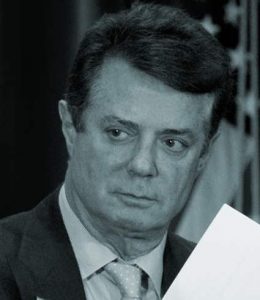
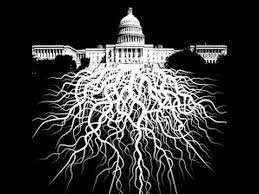
Special Prosecutor Mueller Indictments
Paul Manafort, who had been Donald Trump’s campaign manager, was indicted last week by special prosecutor Mueller for 12 counts of money laundering involving at least $18 million, setting up a secret overseas bank accounts through which $75 million flowed, lying to federal authorities and operating as an unregistered foreign agent for the president of the Ukraine, tax evasion, and conspiracy. Also indicted was his colleague Rick Gates.
Manafort was a Washington insider. He graduated from Georgetown Law School and went on to work for Gerald Ford and Ronald Reagan. He then became, by his own description, an influence peddler. He was a political adviser to the vicious dictatorships of Marcos in the Philippines and Mobuto in Zaire helping them avoid trouble with the United States. He made millions of dollars advising the elected head of the government of Ukraine before he was overthrown in a coup approved and supported by the United States, in particular Secretary of State Hillary Clinton who held that position under the Obama administration before she ran for president.
Along with the indictments, it was disclosed that George Papadopoulos, a former volunteer adviser to Trump during his campaign, had pled guilty to lying to the FBI about having ties with the Russians and was cooperating with the prosecution. He had urged Trump to meet with Russian officials.
Guest – Ray McGovern, an alumnus of Fordham and was a high-ranking CIA analyst for 27 years. His expertise was Russia and he had one on one briefings daily with President George Bush. He broke with the government under George W. Bush over the cooked intelligence used to rationalize America’s illegal war of aggression against Iraq and helped form the organization Veteran Intelligence Professionals for Sanity. His group issued a memorandum to President Obama which demonstrated that the Russians did not hack into the computers of the Democratic Party or Hillary Clinton and did not therefore influence the American election. http://raymcgovern.com/
—-
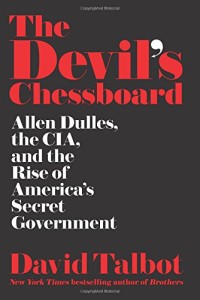
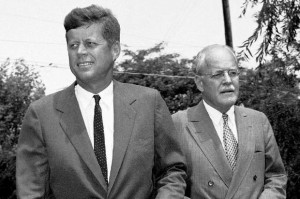
The Devil’s Chessboard: Allen Dulles, the CIA, and the Rise of America’s Secret Government
The assassination of President John Fitzgerald Kennedy on November 22, 1963, 54 years ago, was a turning point in American and world history. The official story has been put forward in the Warren Commission Report. It stated that Lee Harvey Oswald was the lone assassin and that there was no conspiracy. The official story has been widely debunked: it is not believed by some 60% of the American people.
Oliver Stone’s 1991 movie JFK led to the reopening of the investigation by a Committee of the US House of Representatives. The committee concluded that there was a conspiracy. They passed a law, signed in 1992 by President George HW Bush, which called for the release of all remaining intelligence files on the assassination by October 26, 2017. Last week some of the remaining documents were released. Those documents must be released within six months unless President Trump decides not to. The intelligence agencies have a say in what further documents will be released but it is President Trump’s decision. It is not believed that the release of the documents will contradict the official story that Lee Harvey Oswald was the loan assassin and there was no conspiracy.
James R. Douglas wrote the definitive book on the Kennedy assassination, demonstrating conclusively that was the work of the CIA. Why? Because the intelligence agency wanted to stop Kennedy from withdrawing American troops from the Vietnam war and he wanted and was working towards a peaceful resolution of the cold war with respect to American policy towards both the Soviet Union and Cuba.
Guest – David Talbot, the author of the New York Times bestseller Brothers: The Hidden History of the Kennedy Years and the acclaimed national bestseller Season of the Witch: Enchantment, Terror, and Deliverance in the City of Love. He is the founder and former editor in chief of Salon, and was a senior editor at Mother Jones and the features editor at the San Francisco Examiner. He has written for The New Yorker, Rolling Stone, Time, The Guardian, and other major publications. Talbot lives in San Francisco, California.
——————————————————-
Academic Freedom, CIA Sponsored Terror, Civil Liberties, Climate Change, Crony Capitalism, Cuba, Habeas Corpus, Human Rights, NSA Spying, Truth to Power, War Resister
Podcast: Play in new window | Download
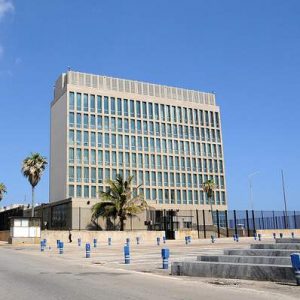
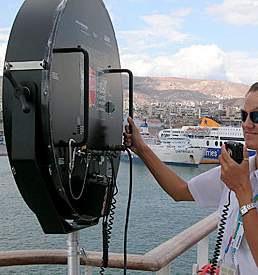
Cuban US Embassy Sonic Weapons Scare
The Trump administration is considering closing the recently reopened US Embassy in Havana after several unexplained incidents that allegedly hurt American diplomats in Cuba. Some lawmakers are calling for the ouster of all Cuban diplomats from the US in addition to the 15 they’ve kicked out of the country. Its a move that would have significant diplomatic implications.
US Secretary of State Rex Tillerson made these suggestions recently. His comments were the strongest indication yet that the US might mount a major diplomatic response, potentially jeopardizing the historic restart of relations between the Cuba and US governments. The two reopened embassies in Washington and Havana in 2015 after roughly a half-century of estrangement.
Of the 21 medically confirmed US victims, some have permanent hearing loss or concussions while others have suffered nausea, headaches and ear-ringing. Some are having problems with concentration or common word recall.
Some victims felt vibrations or heard loud sounds mysteriously audible in only parts of rooms, leading investigators to consider the possibility of a sonic attack. Others heard nothing but later developed symptoms.
The US State Department has emphasized that the US still does not know what has occurred. Cuba has denied any involvement and has said that it wants to help the US resolve the matter.
Investigators have explored the possibility of an electromagnetic weapon, or an advanced spying operation gone awry. The US has not ruled out that a third country or even a rogue faction of Cuba’s national security services may be involved.
Guest – Sandra Levinson, President and Executive Director of the Center for Cuban Studies. She was one of the Center’s founders in 1972. In 1991 Levinson spearheaded a lawsuit against the U.S. Treasury Department which resulted in legalizing the importation of original Cuban art. She is currently directing works at the Cuban Art Space, which she founded in 1999, to properly house and archive the thousands of posters, photographs and artworks which the Center has collected in the past 42 years.
Contact the Center for Cuban Studies at 212.242.0559.
—-
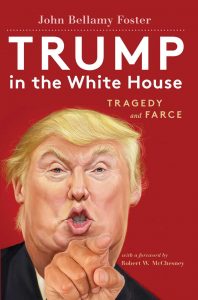
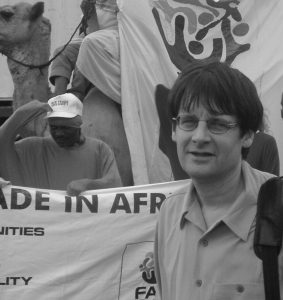
Trump in the White House: Tragedy and Farce
The great issues of our times are the return of fascism to the United States and Europe, climate change, and the stagnation of the world capitalist economy. These great issues are pressing and interconnected.
We used to think that the experience of World War II guaranteed that no politician would ever advocate the ideas of fascism.
But the election of Donald Trump a year ago has caused a serious reconsideration of fascism and it’s relationship to capitalism and to democracy.
The neoliberals paved the way for Trump. Now he and the forces aligned with him have put our democratic institutions under attack in order to protect the rule of the wealthy. The attacks include the right to vote, labor unions, public education, an independent news media, independent public universities, the privatization of much of traditional governmental functions and making it almost impossible to launch a new political party.
The election of Trump is a political development that for concrete sociological reasons allows us to see it for what it is, as a type of neo-fascism. Only by identifying the phenomena correctly can we effectively fight it.
Jack London wrote a century ago in his famous book The Iron Heel that “There is a shadow of something colossal and menacing that even now is beginning to fall across the land. Call it the shadow of an oligarchy, if you will; it is the nearest I dare approximate it. What is nature may be I refuse to imagine. But what I want to say was this: You are in a perilous position.”
Guest – John Bellamy Foster is editor of Monthly Review and professor of sociology at the University of Oregon. He has written widely on political economy and has established a reputation as a major environmental sociologist. He is the author of Marx’s Ecology: Materialism and Nature (2000), The Great Financial Crisis: Causes and Consequences (with Fred Magdoff, 2009), The Ecological Rift: Capitalism’s War on the Earth (with Brett Clark and Richard York, 2010), and The Theory of Monopoly Capitalism: An Elaboration of Marxian Political Economy (New Edition, 2014), among many others.
CIA Sponsored Terror, Civil Liberties, Criminalizing Dissent, Human Rights, Political Prisoner, Prison Industry, Supreme Court, Targeting Muslims, Torture, Truth to Power, War Resister
Podcast: Play in new window | Download
Updates:
- Co-host Attorney Heidi Boghosian Discusses Robert “Sugar Bear” Lark Case
- Government Targeting Black Resistance Groups
—-

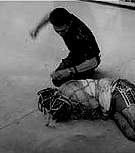
Victory In Al Shimari v CACI
President Trump told us during the campaign that he was in favor of torture because “it works.“ The Center for Constitutional Rights recently won a significant round in a case against a private military contractor, CACI who had tortured three of its clients at the infamous Abu Graib prison in Iraq in 2003 and 2004.
When he was president of the Center for Constitutional Rights, Michael Ratner maintained that if the torturers were not prosecuted, the practice of torture would be repeated. In fact none of the architects were held accountable in court. That is why the this recent procedural victory by CCR, in the case of Al Shimari is so important.
Guest – Attorney Katherine Gallagher is a Senior Staff Attorney at the Center for Constitutional Rights. She works on universal jurisdiction and international criminal law cases involving U.S. and foreign officials and torture and other war crimes, and cases involving private military corporations and torture at Abu Ghraib. Her major cases include Al Shimari v. CACI, the international U.S. torture accountability cases, and Survivors Network of those Abused by Priests (SNAP) v. Vatican, seeking accountability for the crimes against humanity of sexual violence by clergy and cover-up.
—-
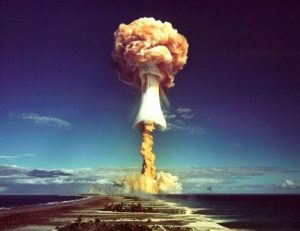
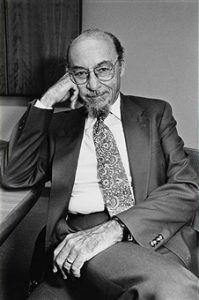
International Association of Lawyers Against Nuclear Arms: North Korea
Not since the Cuban missile crisis of 1962, 55 years ago, has the prospect of nuclear war seemed so frightening. President Donald Trump, who alone can commence a nuclear attack, has threatened North Korea with “fire and fury.“ North Korea has a population of 25 million people.
Gabriel Sherman writing recently in the magazine Vanity Fair said that the situation with Trump has gotten so out of control that Trump’s Chief of Staff, General John Kelly, and his Secretary of Defense, General Jim Mattis, have discussed ways to stop Trump should he order a nuclear attack.
Obviously, the solution to winding down the escalating confrontation needs to be one of diplomacy. But when Secretary of State, Rex Tillerson, the chief diplomat in America, attempted to do just that President Trump said publicly that “you are wasting your time.“
Guest – Peter Weiss, distinguished international lawyer and President Emeritus of the International Association of Lawyers Against Nuclear Arms and its US affiliate, the Lawyers Committee on Nuclear Policy. He helped draft their October 10th, 2017 statement North Korea: Solution or Disaster. Peter Weiss was a founder of the Center for Constitutional Rights and its former Vice President.
———————————-
CIA Sponsored Terror, Civil Liberties, Climate Change, Human Rights, Political Prisoner, Truth to Power, War Resister
Podcast: Play in new window | Download
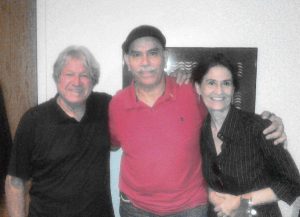
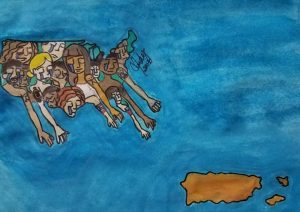
Puerto Rico Disaster Recovery, The Jones Act And Federal Aid
The devastation to Puerto Rico from Hurricane Maria has been likened to the impact of an atomic bomb, destroying the U.S. territory, and leaving nearly 3.5 million U.S citizens without power, limited access to food and water, and a collapsed infrastructure. Donald Trump was quick to blame the island nation for its problems, even highlighting its financial debt to Wall Street.
Puerto Rico has a history of struggling for federal aid for natural disasters contrasted with those on the mainland. The White House response to much-needed funding post-Maria is to wait for a “full assessment” and “fact-finding” process. Early reinforcements from the Federal Emergency Management Agency (FEMA) are appalling, if nonexistent: Diesel fuel for generators is scarce. Towns outside metro areas are unreachable. Hospitals can’t treat patients. Streets are flooded, looting is rampant, highways destroyed. The National Guard, FEMA, Red Cross or federal vehicle have yet to be spotted on the island. None of this is new.
In 1989, when Hurricane Hugo hit South Carolina, Puerto Rico and the USVI, the elder President Bush was criticized for not responding quickly enough. More relief for the Caribbean was added to a bill initially designed to address earthquake damage in California. And when Hurricane Georges pounded Puerto Rico in 1998, it took half a year for the federal government to act on a long-term plan for the island.
A central reason for this is the Jones Act, a century-old shipping law often accused of stifling the Puerto Rican economy. Among other things, the Act requires that domestic shipping be conducted by U.S.-owned, U.S.-made ships staffed by American crews. That means, for example, that all food from the mainland—and Puerto Rico imports 85 percent of what it consumes—must be brought in U.S. ships.
Nydia Velázquez, the Puerto Rico–born congresswoman who represents parts of New York City, says she will ask Congress for a one-year waiver to Jones Act requirements for the territory. That might test Washington’s willingness to change its approach to Puerto Rico and to see if Puerto Ricans’ status as citizens without full rights is really working.
Guest – Carlito Rivera, co-editor of the Old and New website, active with the Campaign to Bring Mumia Home, and a Former member of the Young Lords. CONTACT: El Maestro – Community Center and Boxing Gym in the Bronx, Puerto Rican Nationalist Party Headquarters 646-299-6507.
Since the recording of this interview, President Trump agreed to waive the Jones Act, which will temporarily lift shipping restrictions and allow the people of Puerto Rico to receive necessary aid.
—-
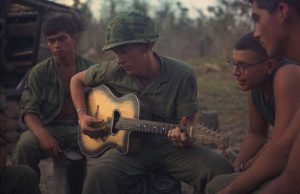
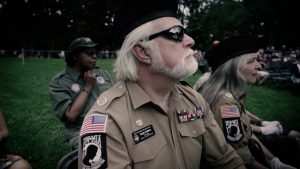
Burns and Novick: Masters of False Balancing
Ken Burns and Lisa Novick have made an influential documentary called “The Vietnam War” whose 10 episodes have been running on PBS. Burns said that his film “will inspire our country to begin to talk and think about the Vietnam war in an entirely different way.” Novak said that “we are all searching for some meaning in this terrible tragedy.”
The United States took over the war in 1954 from the defeated French who failed despite massive American support to recolonize Vietnam after World War II. The United States left Vietnam 1975 when they were forced to withdraw troops in the teeth of massive Vietnamese resistance, a huge antiwar movement at home, and the refusal of GIs in Vietnam to continue to fight.
At least 3 million Vietnamese were murdered. 58,200 American soldiers were killed. 19 million gallons of toxic defoliants, 7.5 million tons of bombs, including 400,000 tons of napalm were dropped on the Vietnamese. Without a Navy or Air Force, the Vietnamese resistance lived in tunnels or hid in the jungle.
The CIA’s infamous operative in Vietnam, Colonel Edward Lansdale, who helped install the US supported dictator Diem, quoted Robert Tabors The War of the Flea saying “there is only one means of defeating an insurgent people who will not surrender, and that is extermination. There is only one way to control a territory that harbors resistance, and that is to turn it into a desert.”
The Burns-Novik film’s opening sentence says that the war was started “in good faith by decent people out of fateful misunderstandings, American overconfidence and cold war misunderstandings.” Noam Chomsky, who came to prominence in 1967 as a critic of the war, and who was not interviewed in the film, wrote that the US “went to war in Vietnam for a very good reason. They were afraid Vietnam would be a successful model of independent development and that it would have a virus effect – if that others who may try to follow the same course.”
Guest – Jerry Lembcke, Professor Emeritus of Sociology at Holy Cross College.
Professor Lempke is recognized for work on post-Vietnam War American culture, studies of how we continue to process the war through film, literature, folklore, and of course television documentaries. He is the author and editor of many books, most notably his 1998 book “The Spitting Image: Myth, Memory and the Legacy of Vietnam”. He served as a chaplain’s assistant in Vietnam and is a member of Vietnam Veterans Against the War.
—————————————————























